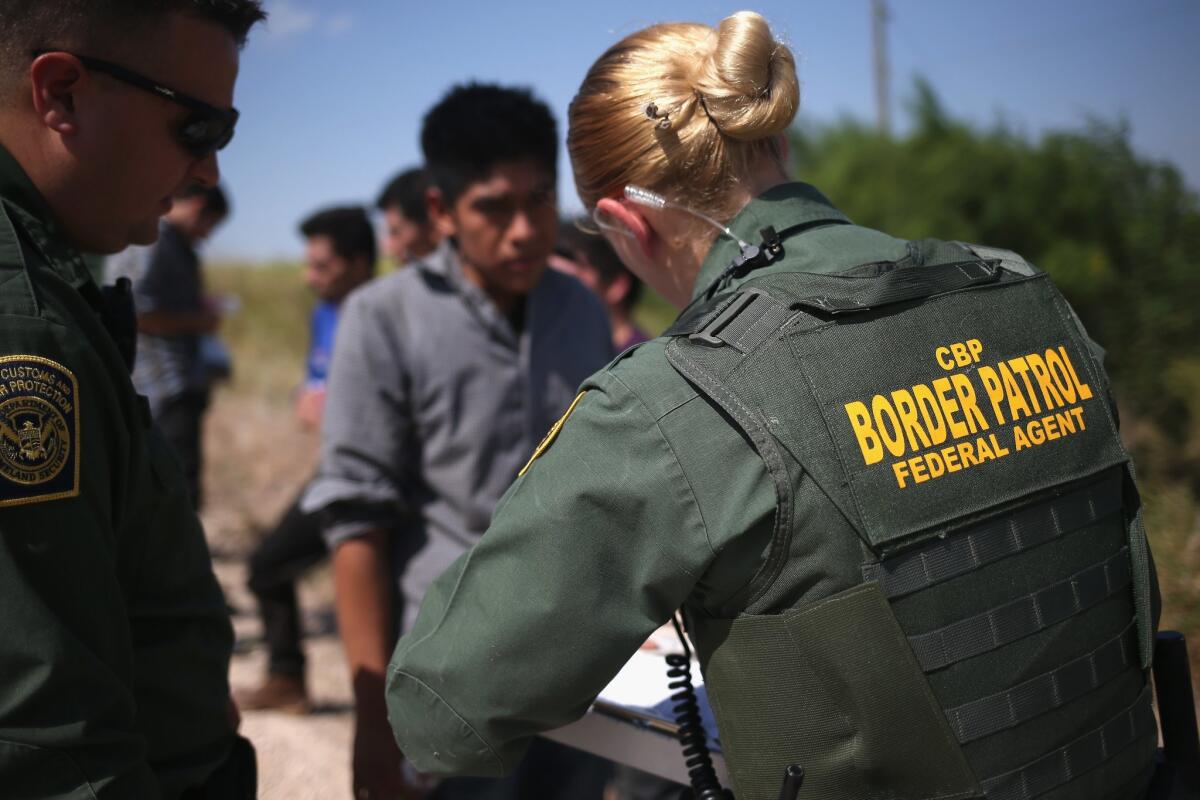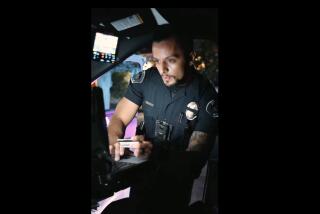Should Border Patrol require body cameras? Internal review says no

U.S. Border Patrol agents detain immigrants caught crossing the border from Mexico into the United States in August near McAllen, Texas. A federal agency is recommending that border agents not wear body cameras.
Reporting From Houston — An internal review by U.S. Customs and Border Protection officials found that staff at the nation’s largest law enforcement agency shouldn’t be required to wear body cameras in the field, despite the growing popularity of the devices among police and advocates.
According to a copy reviewed by the Los Angeles Times, officials found the cameras’ benefits were outweighed by their drawbacks, including cost, damage to morale, vulnerability to hacking and the agents’ rugged working conditions.
Officials field-tested cameras with 90 agents and officers across the country and consulted Los Angeles and New Orleans police. After a yearlong review, they found most body cameras “were not designed to meet the rigors required by CBP officers and agents,” noting the cameras had “limited effectiveness.”
Rather than distribute body cameras to agents, even as a pilot project, the report recommends a “risk-based deployment” based on “operational need.”
The findings were summarized in an August draft report that’s still subject to approval by Commissioner R. Gil Kerlikowske, who last year announced plans to test the cameras.
Jenny Burke, a spokeswoman for Customs and Border Protection, said in an email that the agency “has been transparent in providing regular updates on the status of the Body Worn Camera feasibility study since it began” and that the draft report “is a dated version that does not reflect the agency’s deliberations over the past months or conclusions of CBP leadership.”
Burke did not clarify what the agency’s leaders had concluded.
Border Patrol employs about 60,000 people, and Kerlikowske has not said whether he plans to distribute the cameras and, if so, whether they would go to the roughly 21,000 agents stationed on the southern border or the 24,000 officers at the country’s ports of entry.
“Putting these in place, as you know, is not only complicated, it’s also expensive,” Kerlikowske said at a briefing last year. “We want to make sure we do this right.”
President Obama supports the use of body cameras by police, and his administration has pledged millions to local departments that have adopted them, particularly after clashes between police and protesters in Ferguson, Mo., that prompted a national discussion about racial profiling and use of force by police.
Violent incidents along the border remain a significant problem for the agency. Assaults on agents are reported daily -- 390 in 2015, up 5% from 373 assaults in 2014.
Three people have been killed in altercations with Border Patrol agents along the U.S. borders in calendar year 2015. Last year, four people were shot to death by Border Patrol agents, according to a tally kept by the American Civil Liberties Union’s Regional Center for Border Rights, based in Las Cruces, N.M.
“Body-worn cameras have the potential to provide huge benefits for Customs and Border Protection and the public,” said Jacinta Ma, director of policy and advocacy at the Washington-based National Immigration Forum, which released a report Friday recommending the agency start using the cameras.
“As the largest law enforcement agency in the country, CBP has an opportunity to step up,” Ma said, adding that body cameras “will help keep people safe — agents, officers and the public alike.”
But the agency may face resistance from Border Patrol staff and their union, the National Border Patrol Council. Union officials have expressed concern in the past that footage from the cameras could be used to discipline agents or force them from their jobs.
“We haven’t received the parameters in which they will be used or if they can hold up to the conditions in which we work,” said Chris Cabrera, a union spokesman based in McAllen, Texas. “Until we know more it would be hard to say if it is a good or bad idea. There are, however, better ways the money could be spent. We are technologically deficient in many areas.”
Follow me for the latest in national news @mollyhf
Hennessy-Fiske reported from Houston and Bennett from Washington.
More to Read
Sign up for Essential California
The most important California stories and recommendations in your inbox every morning.
You may occasionally receive promotional content from the Los Angeles Times.












